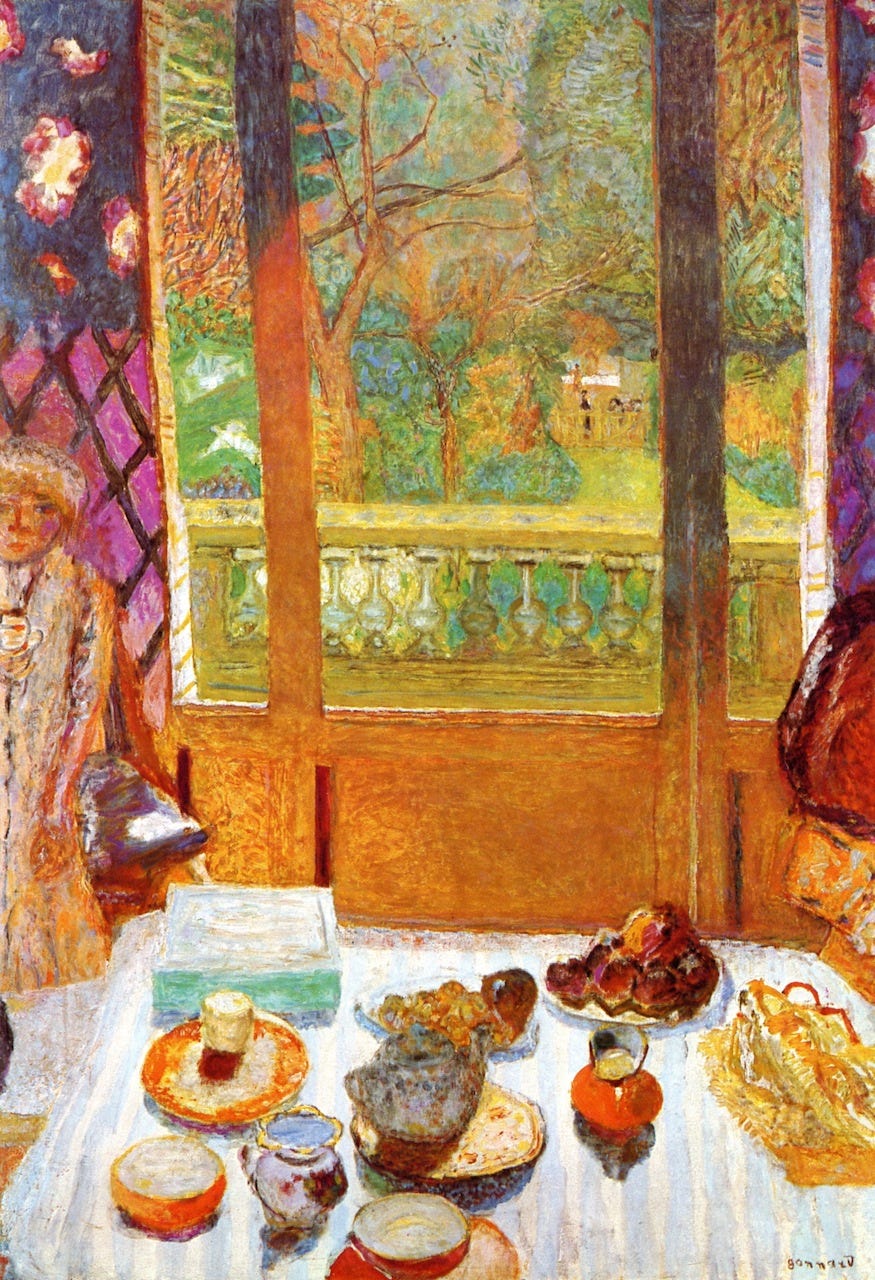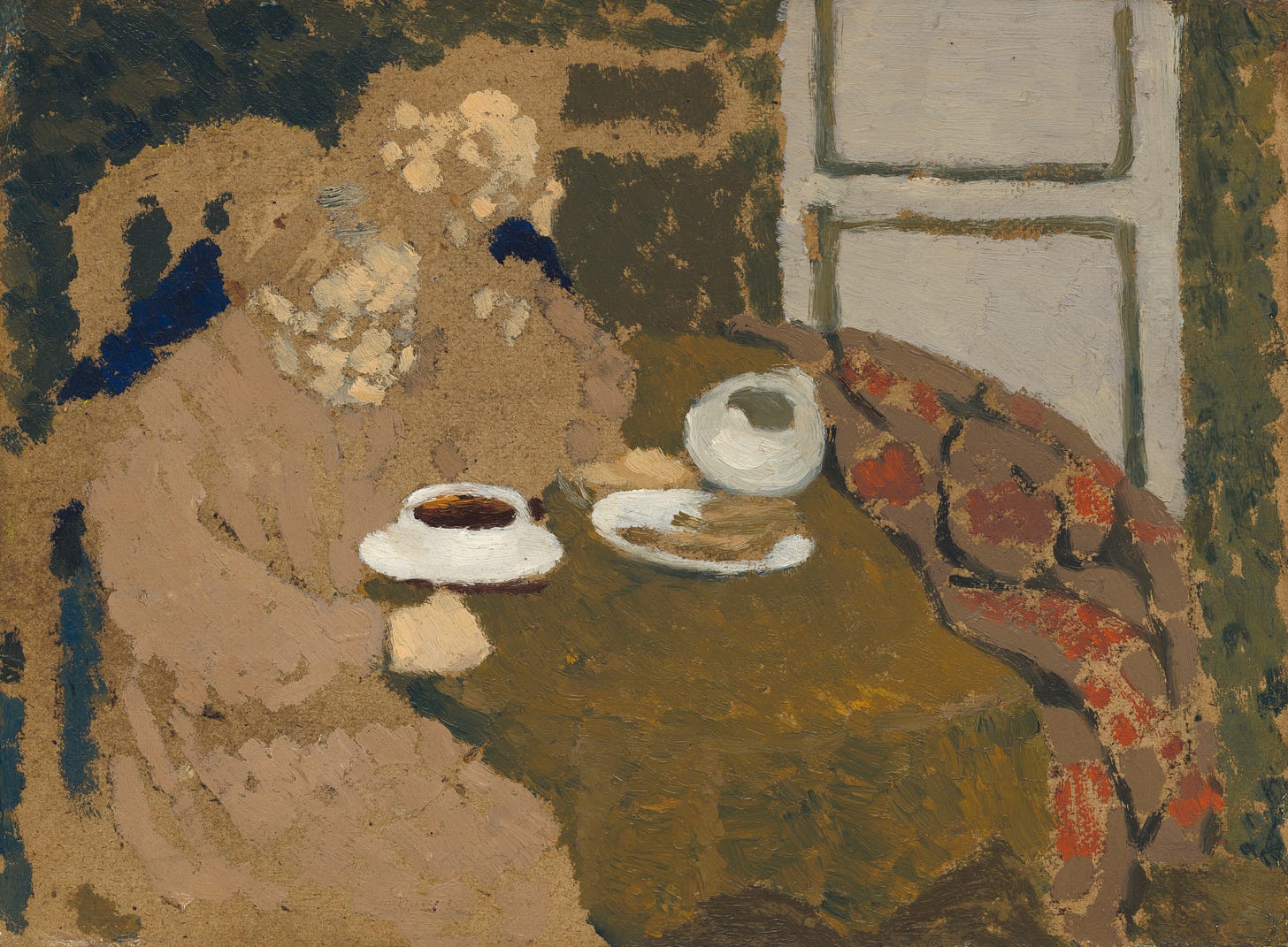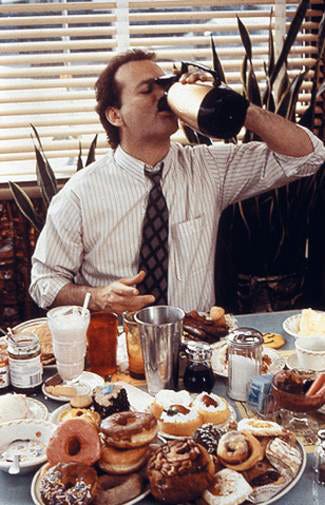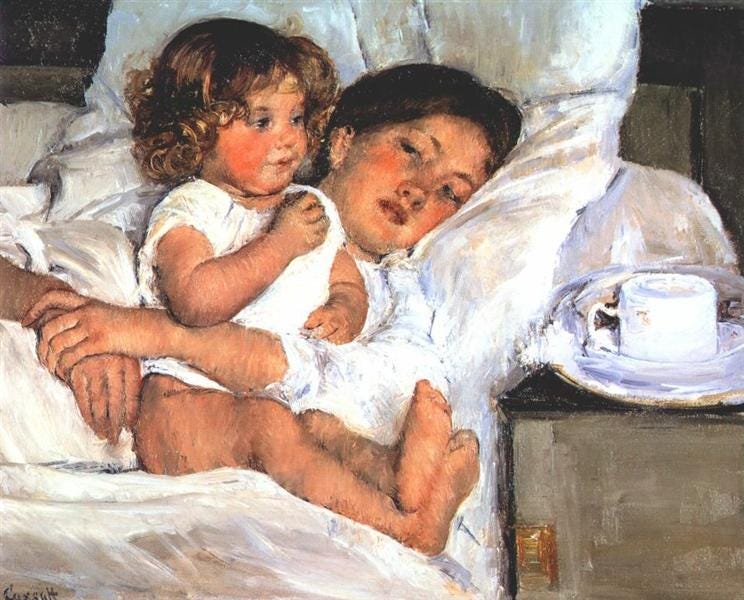Once, when I was having a bit of a low moment (I'm much better now but you're very kind for worrying), I made a list of all the things in my life that made me happy. It still sits there, pinned in my notebook app of choice, with the title 'happy list'.
When I look back on it now, I can spot some familiar patterns. They might be the ones you'd expect - relationships (laughter, belonging), art (beautiful songs, beautiful sentences), the beauty of nature (moons, sunsets, shimmering water), memories. But something else jumped out. It appears, as I read things back, that what provides me with an awful lot of joy, somewhat surprisingly, is breakfast.
I have notes about coffee, eggs, pastries, first lights, dewey grass, newspapers in cafés and early morning drive-throughs en-route to the airport. So what is it about the first meal of the day that offers such contentment? Is it something to do with the vague sense of possibility, of a day unsullied by mindless inactivity? Or do I just really enjoy my caffeine hit?
It's back to the bookshelves again to ask some smarter and more gifted people than I to explain.
The magic of breakfast, in Howl's Moving Castle, Hayao Miyazaki, 2004
There's definitely something in that sense of excitement or optimism that comes to the fore during breakfast, hope for a day as yet unlived. Ask Mary Lamb:
A dinner party, coffee, tea, / Sandwich, or supper, all may be / In their way pleasant. But to me / Not one of these deserves the praise / That welcomer of new-born days, / A breakfast, merits; ever giving / Cheerful notice we are living / Another day refreshed by sleep, / When its festival we keep.
Extract from Breakfast, Mary Lamb, 1826
I also adore John Steinbeck's short story Breakfast, not just for the working class camaraderie it evokes, but also the sense of stillness before action, quiet appreciation before labour, beauty before brawn.
‘We filled our plates, poured bacon gravy over our biscuits and sugared our coffee. The older man filled his mouth full and he chewed and chewed and swallowed. Then he said, “God Almighty, it’s good;” and he filled his mouth again.
The young man said, “We been eating good for twelve days.”
We all ate quickly, frantically, and refilled our plates and ate quickly again until we were full and warm. The hot bitter coffee scalded our throats. We threw the last little bit with the grounds in it on the earth and refilled our cups.
There was color in the light now, a reddish gleam that made the air seem colder. The two men faced the east and their faces were lighted by the dawn, and I looked up for a moment and saw the image of the mountain and the light coming over it reflected in the older man’s eyes.
Then the two men threw the grounds from their cups in the earth and they stood up together. “Got to get going,” the older man said.’
Breakfast, John Steinbeck, 1938
A Cup of Coffee, Roy Lichtenstein, 1961
Breakfast, then, is a time to be still and to think before the responsibilities of the day take hold their iron grip. But what kind of breakfast should accompany such thought? According to comic novelist Peter De Vries, there should be a thinking man's cereal called Joyce Carol Oates. Ho ho.
Still Life with Cheeses, Almonds and Pretzels, Clara Peeters, c. 1615
There were two literary breakfasts that jumped straight into my mind when conceiving of this week's essay. The first was in Gravity's Rainbow, which it was a delight to dig out and rediscover. Breakfast as distraction, breakfast as respite, breakfast as a softness and fragility against the hard reality of life during war time. I still smell bananas when anyone mentions this book:
'Now there grows among all the rooms, replacing the night's old smoke, alcohol and sweat, the fragile, musaceous odor of Breakfast: flowery, permeating, surprising, more than the colour of winter sunlight, taking over not so much through any brute pungency or volume as by the high intricacy to the weaving of its molecules, sharing the conjuror's secret by which - though it is not often Death is told so clearly to fuck off - the living genetic chains prove even labyrinthine enough to preserve some human face down ten or twenty generations... so the same assertion-through-structure allows this war morning's banana fragrance to meander, repossess, prevail. Is there any reason not to open every window, and let the kind scent blanket all Chelsea? As a spell, against falling objects'
Gravity’s Rainbow, Thomas Pynchon, 1973
The Breakfast Room, Pierre Bonnard, c. 1947
The second breakfast that revealed itself in moments was, of course, Leopold Bloom and those damned kidneys. Most of the extracts I've sifted through this week have had me salivating - I'd give anything to be there in Steinbeck's imagined world of red light, cold air and hot coffee - but Joyce makes me feel like an unwanted intruder into what should remain a very private ritual:
'Mr Leopold Bloom ate with relish the inner organs of beasts and fowls. He liked thick giblet soup, nutty gizzards, a stuffed roast heart, liverslices fried with crustcrumbs, fried hencods’ roes. Most of all he liked grilled mutton kidneys which gave to his palate a fine tang of faintly scented urine'
And when he finally digs in:
'Cup of tea now. He sat down, cut and buttered a slice of the loaf. He shore away the burnt flesh and flung it to the cat. Then he put a forkful into his mouth, chewing with discernment the toothsome pliant meat. Done to a turn. A mouthful of tea. Then he cut away dies of bread, sopped one in the gravy and put it in his mouth. What was that about some young student and a picnic? He creased out the letter at his side, reading it slowly as he chewed, sopping another die of bread in the gravy and raising it to his mouth.
He sopped other dies of bread in the gravy and ate piece after piece of kidney.'
Ulysses, James Joyce, 1922
It's often said that literature can be many things at once, and that, for me, sounds as delicious as it does disgusting.
Illustration for 100th anniversary edition of Ulysses, Eduardo Arroyo, 2022
Another acquired culinary taste can be found in the musings of Iris Murdoch's detestable Charles Arrowby in The Sea, The Sea, who, when he's not seeking to assert his dominance over vulnerable women, is usually pondering his next meal in exacting detail:
'I ate and greatly enjoyed the following: anchovy paste on hot buttered toast, then baked beans and kidney beans with chopped celery, tomatoes, lemon juice and olive oil (Really good olive oil is essential, the kind with taste, I have brought a supply from London). Green peppers would have been a happy addition only the village shop (about two miles pleasant walk) could not provide them (no one delivers to far-off Shruff End, so I fetch everything, including milk, from the village). Then bananas and cream with white sugar (Bananas should be cut, never mashed, and the cream should be thin). Then hard water biscuits with New Zealand butter and Wensleydale cheese. Of course I never touch foreign cheeses.'
The Sea, The Sea, Iris Murdoch, 1978
Glass of Water and a Coffeepot, Jean-Baptiste-Simeon Chardin, c. 1761
Less ornate is Cormac McCarthy in Cities of the Plain:
'They were all at the table eating when Billy pushed open the door and came in. Socorro came and took the plate of biscuits and carried them to the oven and dumped them into a pan and put the pan in the warmer and took hot biscuits from the warmer and put them on the plate and carried the plate back to the table. On the table was a bowl of scrambled eggs and one of grits and there was a plate of sausage and a boat of gravy and bowls of preserves and pico de gallo and butter and honey.'
Cities of the Plain, Cormac McCarthy, 1998
Two Women Drinking Coffee, Edouard Vuillard, c. 1893
Cities of the plain, dishes of the plain. Honestly, for me it seems that a simple listing of food items can be of literary merit, so let's have another:
'The tea consumed was the very best, the coffee the very blackest, the cream the very thickest; there was dry toast and buttered toast, muffins and crumpets; hot bread and cold bread, white bread and brown bread, home-made bread and bakers' bread, wheaten bread and oaten bread; and if there be other breads than these, they were there; there were eggs in napkins, and crispy bits of bacon under silver covers; and there were little fishes in a little box, and devilled kidneys frizzling on a hot-water dish; which, by the bye, were placed closely contiguous to the plate of the worthy archdeacon himself. Over and above this, on a snow-white napkin, spread upon the sideboard, was a huge ham and a huge sirloin; the latter having laden the dinner table on the previous evening. Such was the ordinary fare at Plumstead Episcopi.'
Anthony Trollope, The Warden, 1855
Sometimes, it would appear that abundance is the order of the day, which brings me to my favourite breakfast on the silver screen. Upon realising that he's destined to relive the same day on repeat, Bill Murray's Phil in Groundhog Day decides to start enjoying himself, which he does by ordering the finest morning feast I've ever laid my salivating eyes on. As Andie MacDowell's Rita says, 'I like to see a man of advancing years throwing caution to the wind - it's inspiring.'
Another character who impresses his female co-lead with his elaborate breakfast-ordering-gymnastics is Daniel Day Lewis in PTA’s Phantom Thread. It takes a talented actor to lift the words 'a Welsh rarebit with a poached egg on top, please' from a script and make it sound as though it's charged with sexual energy. Even more impressive on Vicky Krieps' part is that he's not the one who steals the scene:
But our celebration of breakfast needn't be confined to the elaborate. There's joy to be had in the simplicity of toast, which can be elegantly paired with Streetband's 1978 song of the same name:
Scrape that toast, boys.
And maybe therein lies my answer. For all the talk of kidneys, bananas and anchovy paste, perhaps the humble slice of toast is the greatest breakfast of them all. As British food writer and journalist Nigel Slater once said...
'It is impossible not to love someone who makes toast for you'
Breakfast in Bed, Mary Cassatt, 1897













I relate to your love of breakfast as well—particularly on a weekend when I have time to bake a favorite treat or prepare pancakes 🥞 while watching a favorite costume drama with a full staff preparing a delectable morning meal on silver serving trays. Thanks for this (outside of the repugnant _Ulysses_ reference) delightful posting!
This all sounds delightful and good for the soul as well as the belly (maybe not the blood vessels in the case of some described) but... Who is cooking all this Welcome to the Morning food? Surely not the one who simply sits down to eat. I happily consume breakfast on the road at a hotel buffet or diner, but if it means rising two hours early to slave over a stove, coffee with my feet up will do.